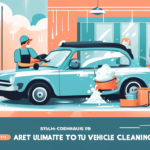Every music lover knows that there’s nothing quite like the warm, rich sound of a spinning LP record. However, with great pleasure comes great responsibility. How can you ensure your cherished collection remains in pristine condition? The secret lies in proper cleaning LP records. From preventing scratches to eliminating dust, understanding the best practices for cleaning LPS is essential for any vinyl enthusiast.
As vintage aesthetics and analog sound gain popularity in today’s digital world, many collectors are turning their attention to cleaning vinyl records. Unfortunately, the journey is often riddled with confusion and misinformation. With many cleaning options available—from DIY solutions to professional services—it’s important to know the implications of each choice.
This guide serves as your ultimate resource for effectively cleaning LP records. We’ll explore the essential tools you need, provide a step-by-step process for cleaning, and highlight common mistakes to avoid. By the end of this article, you’ll understand not just how to keep your collection in top shape, but also why regular maintenance is vital for preserving your vinyl’s sound quality. Let’s dive into the world of vinyl care, so your records can continue to spin beautifully for years to come!
Essential Tools for Cleaning LP Records: Everything You Need
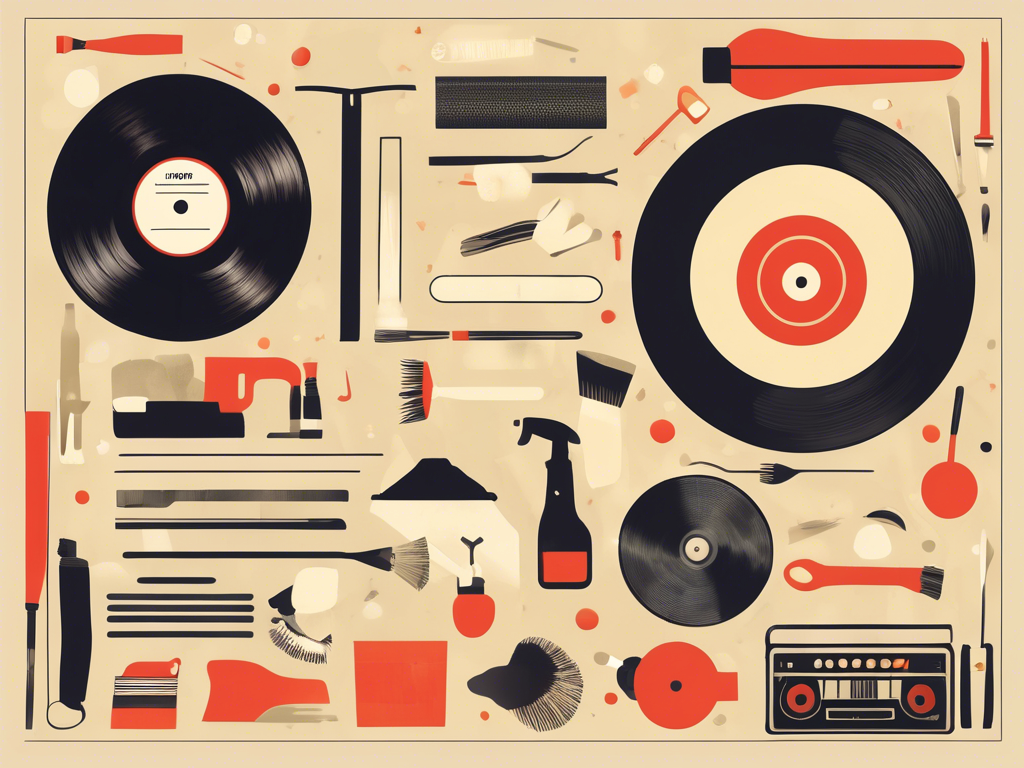
Cleaning Solutions: The Foundation of Vinyl Care
To effectively clean vinyl records, a high-quality cleaning solution is essential. There are various commercial cleaners available specifically designed for LPs, or you can opt for homemade solutions using distilled water and a few drops of dish soap. These solutions help to lift dirt and grime without damaging the delicate grooves of your records. Always ensure that the cleaning solution is free from alcohol or other harsh chemicals, which can harm the vinyl and affect sound quality. 🧴✨
Microfiber Cloths: Gentle Yet Effective
Using the right cloth can make a significant difference when it comes to cleaning LP records. Microfiber cloths are ideal as they are soft and non-abrasive, preventing any scratches while removing dust and fingerprints. Here’s how to use them effectively:
- Lightly dampen the cloth with your chosen cleaning solution.
- Gently wipe the record in a circular motion, following the grooves.
- Buff the record dry with a clean, dry microfiber cloth for added shine.
This method is not only efficient but also safe for your precious collection! 🎶
Record Brushes: A Must-Have Tool
A dedicated record brush is another crucial tool for cleaning LP records. These brushes often contain anti-static properties, making them perfect for removing dust and static electricity. To use a record brush:
- Start by placing the brush at the edge of the record.
- Rotate the record manually to allow the brush to sweep across its surface.
- Lift the brush away after each complete rotation.
This simple technique can significantly enhance your listening experience by minimizing surface noise and preserving your LPs. 🎧
Vacuum Record Cleaners: For the Serious Collector
For those who are serious about maintaining their vinyl collection, a vacuum record cleaner is an investment worth considering. These machines use suction to remove deep-seated dirt and debris from the grooves, ensuring that your cleaning LP records process is thorough. Although they can be more expensive, they offer unrivaled results, particularly for older or heavily used records. Using one can help prolong the lifespan of your LPs and maintain optimal sound quality. 💸🎵
Storage Solutions: Protecting Your Clean Records
Once your records are clean, it’s essential to protect them properly. Invest in high-quality inner and outer sleeves to shield your cleaning LPS from dust and physical damage. Inner sleeves should be anti-static and made from materials that won’t scratch the vinyl. Outer sleeves add an extra layer of protection from environmental factors. Proper storage not only keeps your collection tidy but also maintains the quality of your records over time. 📦💼
Conclusion: The Right Tools for the Best Results
Having the right tools is crucial when trying to clean vinyl records effectively. From cleaning solutions to storage methods, ensuring you have everything necessary will help preserve your collection for years to come. Embrace these essential tools to enjoy the rich sounds of your vinyl like never before! 📀💖
Step-by-Step Guide to Effectively Clean Vinyl Records
Preparing Your Workspace for Cleaning
Before you start the process of cleaning LP records, it’s important to prepare a clean and safe workspace. Begin by selecting a flat surface free from clutter, ensuring that there is enough room to lay down your records without risking scratches or damage. It’s recommended to work in a well-lit area to help identify any dirt or debris on the vinyl. Don’t forget to lay down a soft cloth or mat where you’ll place your records during cleaning. Keeping your workspace organized will make the entire cleaning vinyl records process much smoother. 🛠️✨
Initial Dusting: Brush Off the Surface
The first step in cleaning LPS is to remove any loose dust and debris. Use a soft anti-static brush or a microfiber cloth to gently sweep the surface of the record. Here’s a quick guide:
- Hold the record by its edges to avoid fingerprints.
- Use the brush in a circular motion, following the grooves to lift off dust without pushing it deeper into the record.
- Make sure to brush both sides of the record for an even clean.
This initial dusting is essential, as it prepares the vinyl for deeper cleaning, ensuring no particles scratch the surface. 🎵💨
Deep Cleaning with Solution
Once the dust has been removed, it’s time for a more thorough clean using a cleaning solution. Apply your chosen cleaner to a microfiber cloth (not directly onto the record) and follow these steps:
- Gently wipe the record in a circular motion, making sure to follow the grooves.
This technique helps to lift off grime effectively. - Pay special attention to any visible stains or spots, applying a bit more pressure if necessary while being cautious not to damage the vinyl.
- After cleaning, use a dry microfiber cloth to wipe away any excess moisture or cleaner.
This deep-cleaning step is crucial for maintaining the sound quality of your vinyl and ensuring longevity. 💧🔍
Rinse and Dry: Final Steps in Cleaning
For those using homemade cleaning solutions, a quick rinse can add an extra layer of cleanliness. Lightly rinse the record under lukewarm distilled water while avoiding direct spray on the label. After rinsing:
- Place the record on a clean, lint-free towel to dry.
- Allow it to air dry completely before putting it back in its sleeve.
This final rinsing process helps eliminate any residue left from cleaning agents, allowing your clean vinyl records to shine bright! 🌊📅
Storing Clean Records Safely
Once your records are beautifully clean, storing them properly is essential. Use high-quality inner and outer sleeves to keep your cleaning LPs protected from dust and scratches:
- Store records vertically to prevent warping.
- Keep them in a cool, dry place, away from direct sunlight.
- Avoid stacking records on top of one another to minimize pressure on the vinyl.
Proper storage not only preserves your hard work in cleaning but also enhances the overall longevity of your treasured collection. 📦💖
Common Mistakes to Avoid When Cleaning LPS
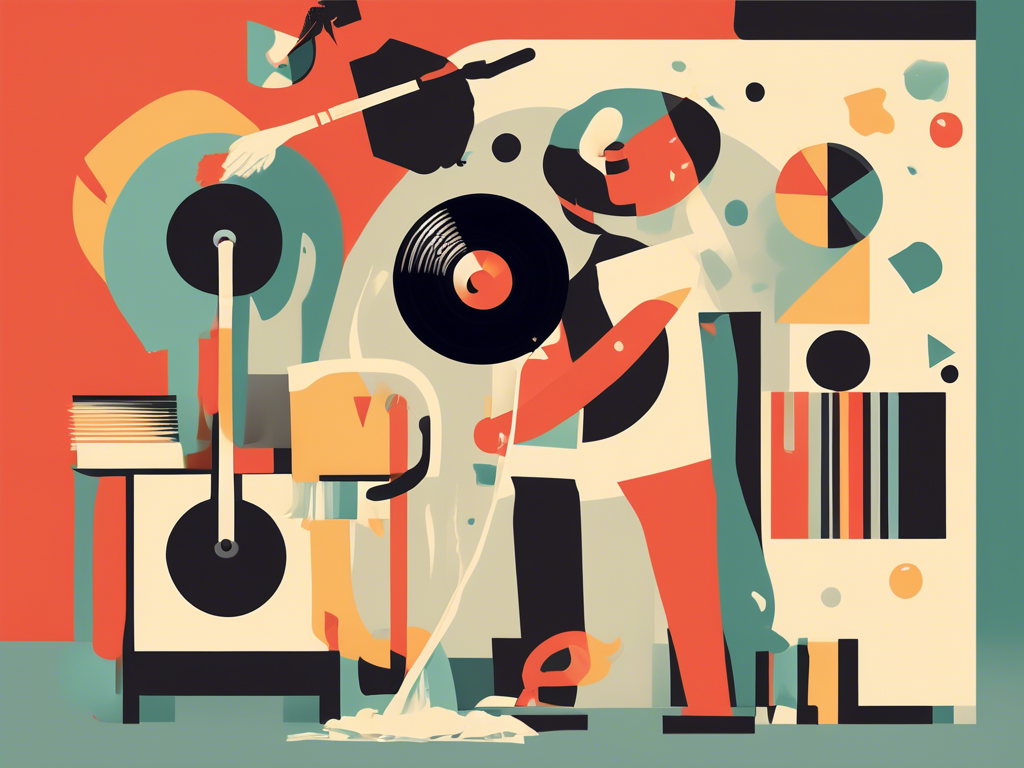
Using Harsh Chemicals
One of the most common mistakes when cleaning LP records is using harsh chemicals. Many people assume that the stronger the cleaner, the better the results. However, products containing alcohol, bleach, or ammonia can damage the vinyl and degrade sound quality. Instead, stick to specially formulated cleaning solutions or homemade mixes that are gentle yet effective. Always check labels before using any product on your precious collection! 🚫🧴
Scrubbing Too Hard
Another frequent error is applying too much pressure when cleaning LPS. Vinyl records are delicate, and excessive scrubbing can cause scratches or wear down the grooves over time. Use a gentle touch, allowing the cleaning solution and cloth to do the work. It’s best to wipe in a circular motion following the record’s grooves, ensuring a thorough clean without damaging the surface. Remember, less is more! 🌟📀
Neglecting to Dry Properly
Failing to dry records adequately after cleaning LPS can lead to moisture damage, which may warp the vinyl. After rinsing your records, always place them on a lint-free towel and allow them to air dry completely before returning them to their sleeves. This simple step is crucial for maintaining the integrity and longevity of your collection! 💧✋
Improper Storage Post-Cleaning
Once your records are clean, storing them incorrectly can undo all your hard work. Avoid stacking records horizontally as this can lead to warping and pressure damage. Always store records vertically and ensure they’re in protective inner and outer sleeves. Keeping them in a cool, dark place away from sunlight will also help preserve their condition. Good storage habits are key to enjoying your clean vinyl records for years to come! 📦💼
Ignoring Regular Maintenance
Lastly, many collectors make the mistake of neglecting regular maintenance. While deep cleaning is essential, routine dusting and taking care of your records can prevent dirt from building up over time. Use an anti-static brush or microfiber cloth to keep your records clean between washes. Establishing a regular cleaning schedule ensures that your cleaning LP records remain in top condition, enhancing both sound quality and longevity! 🗓️🎶
The Benefits of Regularly Cleaning Your Vinyl Collection
Improved Sound Quality
One of the primary benefits of cleaning vinyl records regularly is the enhancement of sound quality. Dust, dirt, and grime can accumulate in the grooves of your LPs, leading to unwanted pops and crackles during playback. By maintaining a consistent cleaning routine, you can ensure that your records deliver the crisp, rich sound they were intended to produce. 🎶✨
Extended Lifespan of Records
Regular maintenance plays a crucial role in extending the lifespan of your vinyl collection. When you take the time to clean LP records, you minimize wear and tear on the grooves, which helps preserve the integrity of the vinyl. This proactive approach means you can enjoy your favorite albums for years to come without the risk of damage or degradation. 📀💖
Enhanced Aesthetic Appeal
A clean vinyl record not only sounds better but also looks better! Dust and fingerprints can detract from the visual appeal of your collection. By incorporating regular cleaning LPS into your routine, you’ll keep your records looking pristine, making it more enjoyable to display and share them with fellow enthusiasts. Plus, there’s a certain satisfaction that comes with having a well-maintained collection! 🌟📸
Prevention of Stubborn Stains
Another significant advantage of regular cleaning is the prevention of stubborn stains. Dirt and oil can set into the vinyl if left untouched, making it increasingly difficult to remove over time. By regularly cleaning vinyl records, you can prevent those tricky stains from forming, ensuring that your collection remains in excellent condition. ⚠️🧼
Better Listening Experience
A clean record translates to a better listening experience. When you take care to regularly clean LP records, you not only improve the sound quality but also reduce background noise. This allows you to fully immerse yourself in the music, enhancing your enjoyment and appreciation for the artistry behind each album. 🎧🎵
Increased Value for Collectors
For those who view their vinyl collection as an investment, maintaining cleanliness can significantly increase its value. Records that are well cared for are more likely to hold their value or appreciate over time. If you ever decide to sell or trade your cleaning LPS, potential buyers will be willing to pay a premium for records that have been kept in excellent condition. 💰📈
How to Remove Dust and Dirt from Your Favorite Records
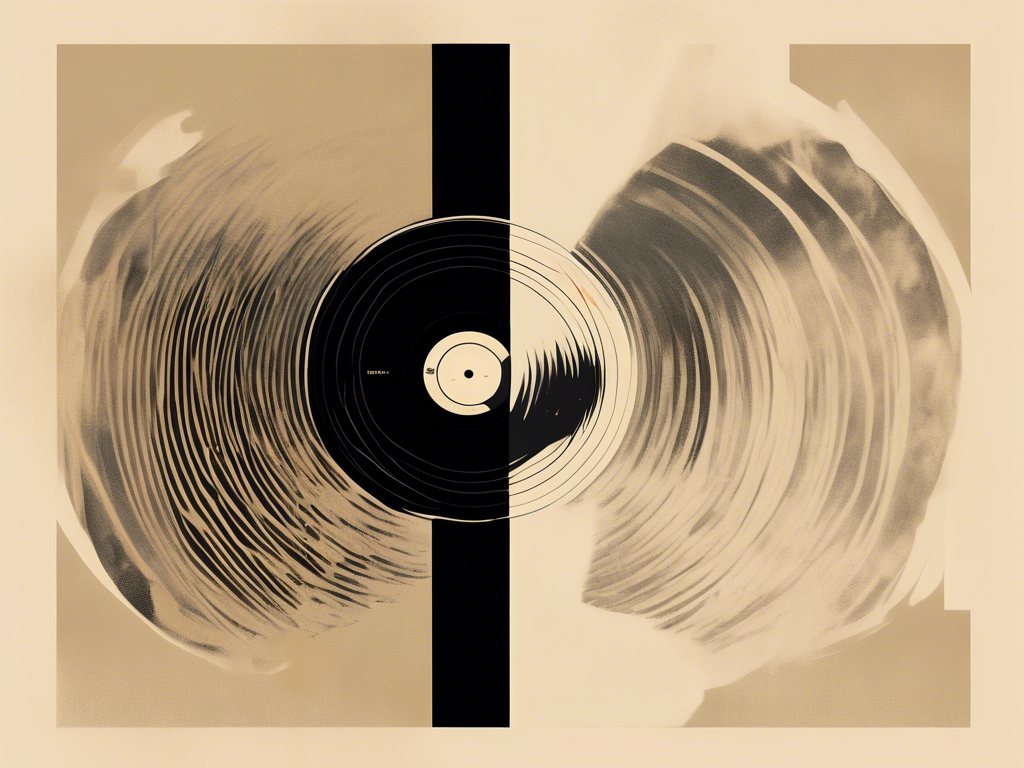
Preparing the Record for Cleaning
Before diving into cleaning LP records, it’s essential to prepare the record for the process. Begin by inspecting your vinyl for any visible dirt or dust. Hold the record by its edges to avoid leaving fingerprints. Placing it on a soft, clean surface can prevent accidental scratches. This initial check ensures you tackle the most significant dirt before applying any cleaning solutions. 🧐✨
Dusting Off with a Brush
Start the cleaning process by removing any loose dust using a dedicated record brush or a microfiber cloth. Here’s how to effectively dust your records:
- Hold the record firmly by its edges.
- Use the brush in a circular motion, following the grooves to lift dust without pushing it further into the record.
- Brush both sides to ensure a thorough clean.
This step is crucial for preparing the vinyl for deeper cleaning, as it helps prevent scratches during subsequent steps. 🎵💨
Using a Cleaning Solution
Once dust has been removed, apply your chosen cleaning solution for a deeper clean. Avoid spraying directly onto the record; instead, dampen a microfiber cloth with the cleaner. Follow these steps:
- Gently wipe the record in a circular motion, adhering to the grooves.
- Give extra attention to stubborn spots, being cautious not to press too hard.
- Wipe down with a dry microfiber cloth to remove excess cleaner and moisture.
This method is vital for maintaining both sound quality and the longevity of your clean vinyl records. 💧🔍
Final Rinse and Drying
For those who opt for homemade cleaning solutions, consider rinsing your records to eliminate any residual cleaner. Lightly rinse under lukewarm distilled water, taking care to avoid the label. After rinsing:
- Place the record on a lint-free towel to absorb water.
- Allow it to air dry completely before storing it back in its sleeve.
This final rinse ensures your records are squeaky clean and ready for optimal playback! 🌊📅
Storage: Keeping Your Records Clean
After cleaning, proper storage is crucial to maintain the cleanliness of your cleaning LPS. Here’s how to store them safely:
- Use high-quality inner sleeves to prevent dust accumulation.
- Store records vertically to avoid warping.
- Keep them in a cool, dry area away from direct sunlight.
Proper storage not only protects your hard work in cleaning but also preserves your treasured collection for years to come! 📦💖
Using DIY Solutions for Cleaning LP Records: Pros and Cons
Benefits of DIY Cleaning Solutions
One of the primary advantages of using DIY solutions for cleaning LP records is cost-effectiveness. Homemade cleaners can often be made with simple ingredients like distilled water, vinegar, and a few drops of dish soap, allowing collectors to save money compared to commercial products. Additionally, DIY solutions can be tailored to individual preferences, ensuring that the cleaning method suits specific vinyl needs. Here are some benefits:
- Affordable and easy to make.
- No harsh chemicals, reducing risk of damage to the vinyl.
- Customizable to fit various cleaning requirements.
These factors make DIY solutions an appealing option for many vinyl enthusiasts! 🧴💰
Risks of DIY Solutions
While DIY solutions have their perks, there are potential drawbacks to consider. Using improper ratios or unsuitable ingredients can lead to residue buildup or even vinyl damage. For example, vinegar, if used in excess, may degrade the vinyl over time. Here are some risks to keep in mind:
- Inconsistent cleaning power if not mixed properly.
- Possible residue left on records, affecting playback quality.
- Risk of damaging delicate vinyl if harsh ingredients are used.
Understanding these risks is crucial to ensure that your cleaning LP records process remains effective and safe. ⚠️📀
Effectiveness Compared to Commercial Cleaners
When evaluating the effectiveness of DIY versus commercial cleaners, it’s important to note that while many homemade solutions can be highly effective, they may not always match the performance of specialized products. Commercial cleaners are specifically formulated to tackle stubborn grime and offer anti-static properties that might be difficult to replicate at home. Nevertheless, the right DIY solution can still provide excellent results when effectively applied. Consider these points:
- Commercial cleaners often have advanced formulas designed for specific issues.
- DIY solutions may require more effort and experimentation to find the right mix.
- Many record collectors swear by their homemade recipes, showcasing their effectiveness.
Ultimately, personal preference and experience play a significant role in determining which route to take for cleaning LPS. 🎵🔍
Environmental Considerations
Using DIY solutions also appeals to environmentally conscious collectors. Many commercial cleaners contain chemicals that can be harmful to both the environment and vinyl records. By opting for homemade mixtures, individuals can avoid harsh additives and reduce their environmental footprint. Some eco-friendly ingredients include:
- Distilled water for rinsing.
- White vinegar, which is biodegradable and non-toxic.
- Natural dish soap that avoids phosphates and synthetic fragrances.
This eco-friendly approach not only helps in cleaning vinyl records but also contributes to sustainable living practices! 🌿🌎
Final Thoughts on DIY Solutions
In summary, using DIY solutions for cleaning LP records comes with its own set of pros and cons. The affordability and customizability attract many collectors, while potential risks and varying effectiveness must be considered. Balancing the convenience of DIY solutions with careful ingredient selection can result in effective and safe cleaning methods. Ultimately, experimenting with different recipes and approaches will help you discover what works best for your collection. Happy cleaning! 🎶✨
Professional vs. DIY: What’s the Best Way to Clean Vinyl Records?
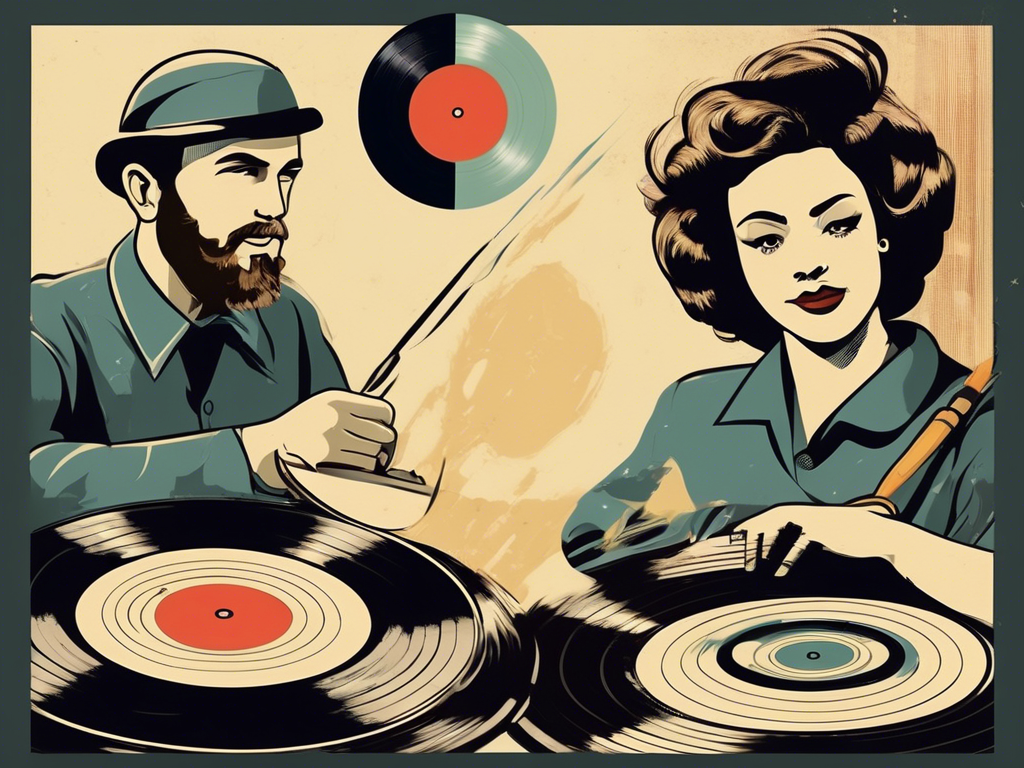
Understanding Professional Record Cleaning Services
When it comes to cleaning vinyl records, professional services offer a level of expertise that many collectors appreciate. These services typically utilize advanced cleaning technologies such as ultrasonic cleaners, which use high-frequency sound waves to remove dirt and debris without damaging the vinyl. Here are some benefits of choosing professional cleaning:
- Thorough removal of deep-seated grime.
- Expertise in handling rare or valuable records.
- Use of specialized equipment designed for optimal results.
For those who value their collection and want the best possible care, professional cleaning can be an excellent investment! 💼🎵
The Appeal of DIY Cleaning Methods
On the other hand, many vinyl enthusiasts prefer the hands-on approach of cleaning LP records themselves. DIY methods allow collectors to tailor the cleaning process to their preferences while using readily available materials. Benefits of DIY cleaning include:
- Cost-effectiveness compared to professional services.
- Full control over the cleaning process and materials used.
- Flexibility to clean at your convenience.
However, successful DIY cleaning requires knowledge and attention to detail to ensure you don’t inadvertently damage your precious LPs. 🧼🔍
Effectiveness of Both Approaches
Both professional and DIY methods have their merits when it comes to cleaning vinyl records. Professional cleaners usually yield higher-quality results due to the use of specialized equipment and techniques. However, with the right tools and techniques, DIY cleaning can also be highly effective for routine maintenance. Considerations for each method include:
- Professional methods are often best for heavily soiled or rare records.
- DIY is ideal for regular upkeep and minor cleanings.
- Assess the condition of your records to decide which method is appropriate.
Understanding the condition of your vinyl can guide you in choosing the cleaning method that works best! 🎧✨
Time and Convenience Factors
Another aspect to consider is the time and convenience involved in each method. Professional cleaning services often require sending your records away, which can take time and may not be practical for large collections. DIY cleaning, conversely, allows you to clean your records at your own pace whenever you choose. Weigh these factors:
- Professional cleaning saves time if you have a significant number of records to clean.
- DIY requires time investment but gives flexibility and control.
- Consider your schedule and how often you listen to your records before deciding.
Ultimately, the choice boils down to personal preference and how involved you wish to be in the maintenance of your collection! ⏰📀
Cost Considerations for Collectors
When it comes to costs, professional cleaning services typically charge per record or offer package deals for larger collections, which can add up quickly. In contrast, DIY cleaning involves minimal expense primarily associated with purchasing cleaning solutions and tools. Here’s a breakdown:
- Professional services can range from $10 to $50 or more per record.
- DIY cleaning can be done for just a few dollars with homemade solutions.
- Weigh potential long-term benefits against short-term costs for your entire collection.
For budget-conscious collectors, DIY methods can be an appealing choice that still delivers great results! 💰📉
Maintaining the Sound Quality of Your Records Through Proper Cleaning
Understanding the Importance of Clean Records
To truly appreciate your vinyl collection, it’s essential to understand how vital cleaning LP records is for sound quality. Dust and grime can settle in the grooves of your favorite albums, leading to pops, crackles, and an overall diminished listening experience. By regularly maintaining your records, you’re not only preserving their physical integrity but also enhancing the audio clarity that vinyl is renowned for. 🎶✨
Frequency of Cleaning: How Often Should You Clean Your Vinyl?
The frequency with which you should clean vinyl records depends on how often you play them and the environment in which they are stored. Here are some guidelines:
- If you play your records frequently, a light cleaning after every few spins can help maintain optimal sound quality.
- For less frequently played records, consider a deeper clean every few months or when you notice visible dust.
- Always perform a thorough cleaning after hosting gatherings where records may have been handled by multiple people.
Establishing a cleaning routine is crucial for ensuring your LPs sound their best at all times! 🔄🧼
Identifying the Right Techniques for Cleaning LPs
When it comes to cleaning LPS, different techniques can lead to varying results. Consider using these methods:
- Dry brushing: Utilize an anti-static brush before each playback to remove loose dust.
- Liquid cleaning: Choose a high-quality cleaning solution and microfiber cloth for deeper cleans, following the grooves with gentle pressure.
- Rinsing: For homemade solutions, a light rinse with distilled water can be beneficial after applying cleaners.
Employing these techniques will help keep your records safe and ensure they produce the best sound possible! 🎧🌀
The Benefits of Using a Record Cleaning Machine
Investing in a record cleaning machine can take your cleaning LP records process to the next level. These machines provide several advantages:
- Efficient removal of dirt and dust embedded in the grooves.
- Consistent results without damaging vinyl due to excessive manual handling.
- Some models even include drying functions, ensuring records are ready for storage immediately.
For collectors who prioritize sound quality, a record cleaning machine can be a game-changer! 💡📀
Conclusion: A Sound Investment in Maintenance
Regularly cleaning vinyl records is an investment in both sound quality and the longevity of your collection. By understanding the importance of cleanliness, establishing routines, and using effective techniques and tools, you can enjoy your records as they were meant to be heard. Keep your collection pristine, and relish the warm sounds of your favorite albums for years to come! 🌟💖
A Complete FAQ on Cleaning LPs: Answers to Your Biggest Questions
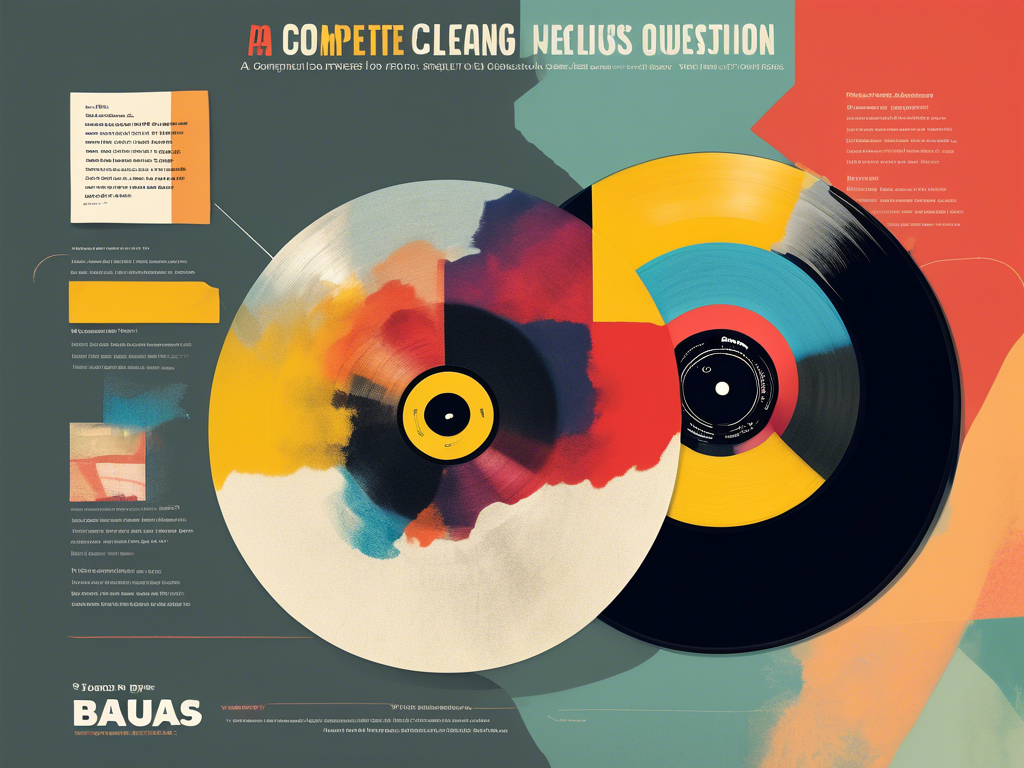
How Often Should I Clean My Vinyl Records?
The frequency of cleaning LP records largely depends on how often you play them and the conditions in which they’re stored. As a general rule:
- If you listen to your records frequently, a light cleaning after every few uses is advisable.
- For records that are played less often, consider performing a deep clean every few months or whenever you notice dust accumulation.
- Make it a habit to clean any record after it has been handled by multiple people, such as during a gathering.
Establishing a consistent cleaning routine will help preserve sound quality and protect your collection! 🎶✨
Can I Use Regular Household Cleaners on My Records?
No, using regular household cleaners on clean vinyl records is not recommended. Many household products contain harsh chemicals that could harm the delicate vinyl surface and degrade sound quality. Stick to products specifically designed for vinyl or create a gentle homemade solution using distilled water and a few drops of dish soap. Always prioritize safety for your precious collection! 🚫🧴
What’s the Best Way to Remove Stubborn Stains?
To tackle stubborn stains when cleaning LP records, follow these tips:
- Apply a high-quality cleaning solution directly onto a microfiber cloth (not the record) and gently rub the stain.
- Use a soft brush or cloth to lift the stain, always moving along the grooves.
- If necessary, repeat the process, but avoid using excessive pressure to prevent damage.
For extremely tough stains, you may want to consider seeking professional cleaning assistance! 💡🔍
Is It Safe to Clean Records with Water?
Yes, but be cautious! Using water can be safe when used correctly. If you’re employing a rinse after applying cleaning solutions:
- Always use distilled water to prevent mineral deposits that can occur from tap water.
- Lightly rinse the record while avoiding direct contact with the label.
- Make sure to thoroughly dry the record on a lint-free towel before storage.
This method helps eliminate any leftover cleaner, ensuring your cleaning LPS shine! 🌊📅
Do I Need to Use Special Tools for Cleaning?
While it’s possible to clean vinyl records using standard tools, investing in specialized equipment can significantly enhance your results. Consider using:
- Anti-static brushes to remove dust effectively.
- Microfiber cloths for gentle scrubbing without scratching.
- Record cleaning machines for deeper cleans if you have a substantial collection.
These tools make the cleaning process easier and more efficient, allowing you to maintain the integrity of your records. 🎧✨
Will Cleaning Damage My Vinyl?
When done correctly, cleaning LP records should not cause any damage. Key steps to ensure safety include:
- Using the appropriate cleaning solutions free from alcohol and harsh chemicals.
- Applying minimal pressure during cleaning to avoid scratches.
- Storing records properly once cleaned to prevent warping or damage.
By following best practices, you can keep your records in excellent condition while enjoying the best sound quality! 📀💖
Summing up
In conclusion, mastering the art of cleaning LP records is not just a matter of preference; it’s essential for maintaining the integrity of your music collection. Throughout this guide, we’ve covered a variety of topics—from the essential tools needed to the step-by-step processes for effective cleaning. We’ve also discussed common pitfalls to avoid and highlighted the benefits of regular maintenance for your vinyl records.
Moreover, we have explored the pros and cons of DIY cleaning solutions versus professional services, allowing you to make informed decisions based on your unique needs. Remember, every time you place your needle on an unclean record, you’re risking sound quality and damaging your precious vinyl. Regular cleaning not only enhances your listening experience but also extends the lifespan of your collection.
As you embark on your journey of keeping your LPs pristine, remember that each record tells a story, and it deserves to be heard in its best possible form. So, gather those essential cleaning tools, dive into the detailed steps we’ve outlined, and don’t shy away from adopting habits that protect your cherished vinyl. Take action today; your ears will thank you tomorrow!



